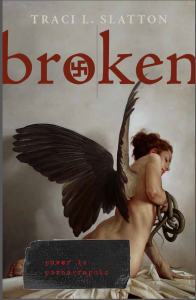I like men.
I like the way they look, hard and hairy in places where I’m soft and curving, an outie where I have an innie. I appreciate the typical male architectural forms: bigger jaws and shoulders, narrower pelvic blocks and a rib cage about as wide as the pelvis, which doesn’t have to flare out to permit childbirth.
I like the way a man smells when he’s been throwing around a football, or bicycling, or swimming, or puzzling over a knotty work issue. The smell of male sweat can be a big turn on, even when it’s acrid. To be sure, a man stepping out of a shower, all clean except for a few shiny residual slicks of soap, and naked except for a towel around his hips, is an even bigger turn on. And I still remember, with clarity and pleasure, a lover whose flesh smelled like vanilla.
I really like the way a man smells after holding a baby. Then both scents blend together: the musk and vetiver man odor, and the intoxicating sugar and vomit fragrance of a baby. Thinking of that combined smell makes me quiver. It arrows in to some primitive part of my lizard brain where reason has no place and species exigency reigns supreme.
I even, usually, like the way men think. They’re problem solvers: a problem is either a wooly mammoth or a saber tooth tiger. Either way, they spear it, drag it home, and eat it. Elegant. It’s true that I’ve been married most of my life and so, of necessity, I’ve learned to tolerate a man’s spear-like, solution-oriented conversational style. If I want to explore all shades, ramifications, and possibilities of a situation, you know, engage in nuanced verbal multi-tasking, isn’t that what my women friends are for?
Good thing I have women friends. I like men, but I don’t understand them.
Speaking of women friends, I have one who likes men even more than I do. She’s tall, blond, gorgeous, and charming, so the affection is mutual. Recently single again after a long relationship, she’s been exploring younger men. She was waxing enthusiastic about dating men in their 20’s.
“For heaven’s sake,” I said. “Aren’t you bored after sex? Why are you dating these young guys?”
“For their energy and optimism, of course,” she responded. “You should try it. I can set you up.” She was, of course, referencing an alternate reality where I, too, was single. She was proposing tangential possibilities, which women find very satisfying.
“Ugh,” I said, imagining her parallel world for the sake of our discourse. “I’d want someone older. These immature guys you like have nothing to say for themselves.”
“But they do,” she demurred. “They have facts. Young men like to have a host of facts at their disposal and you must let them tell you their facts. It makes them feel good about themselves.”
“I’m supposed to let some punk kid spout facts at me?” I clarified.
“Yes, and Traci, you must keep your mouth shut so they don’t know how smart and experienced you are,” she said. I am paraphrasing her words, because she’s even more lovely on the inside than she is on the outside, and she always phrases her statements with kindness and tact.
I burst into laughter. She laughed with me. She’s a friend and she gets me. I’m lucky that way.
But it did set me to thinking about men, those curious creatures, and their need to prove how smart they are. It seems to validate their penis size when they succeed.
All too often men seem to need not only to prove how smart they are, but how smarter they are. Specifically, how smarter than me. Something about me provokes them and they come after me with an unholy critical bent. Maybe it’s not just me, maybe it’s all uppity females.
I see it a lot in male book reviewers, who are, almost universally, nastier and snider than women book reviewers. I’m sorry to make a generalization in an age where generalizations aren’t welcome, but this is what I’ve experienced.
There is something about writing, specifically, that brings out the competitive male ego. I’ve experienced that phenomenon over and over again. Almost two decades ago, a journalist published several pages about how bad my writing was. I had given him a first draft of a novella, with the caveat that it was a rough, crude, unedited first draft and that it hadn’t been spell-checked yet. Remember those days, when spell-check wasn’t automatic?
But my warning fell on ears deaf to all but his own agenda. He went on and on, in his book about something else entirely, about what a terrible writer I was. He generously used a pseudonym, though everyone in the world he was profiling knew it was me.
Did an unspell-checked rough first draft of a novella by a (then) unpublished writer really require such effusive malicious verbiage?
Transference is a bitch.
Maybe so is counter-transference. Recently a man in a helping profession came after me with similar intensity. He’d asked about a proposal I wrote, so I gave it to him. Then, mystifyingly, he turned into a porcupine shooting darts at me, when he discussed it. He’s someone I respect and like, so I was disappointed. And a little sad and hurt, even though I’d long since figured out that he has a formidably critical mind.
The experience did teach me something: to forgive men more. This latter gentleman is pretty highly evoluted, as people go, male or female. If his critical, competitive impulse could run away with him, and he’s actively working on himself, then what hope do less evoluted men have?
What hope do any of us have? I still don’t understand men very well. I’ve got to cut them more slack, for sure. Even if I can’t, as my girlfriend admonished, underplay my own intelligence. Such as it is, and entirely at the mercy of certain lush, entrancing smells.





